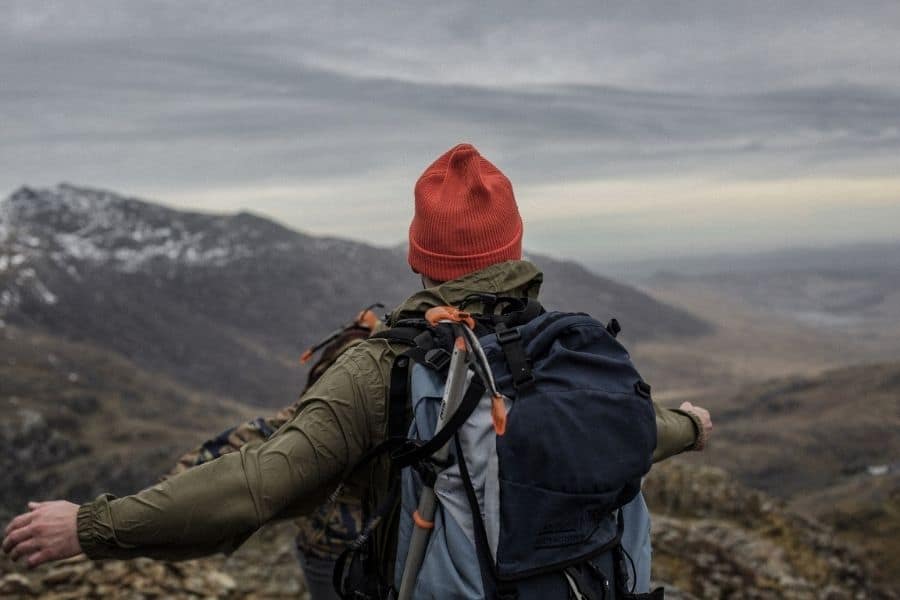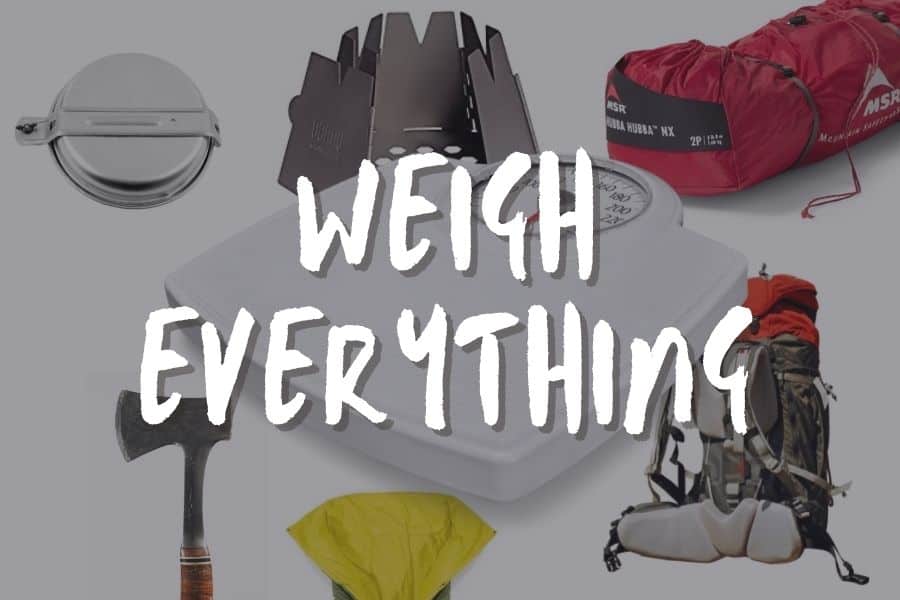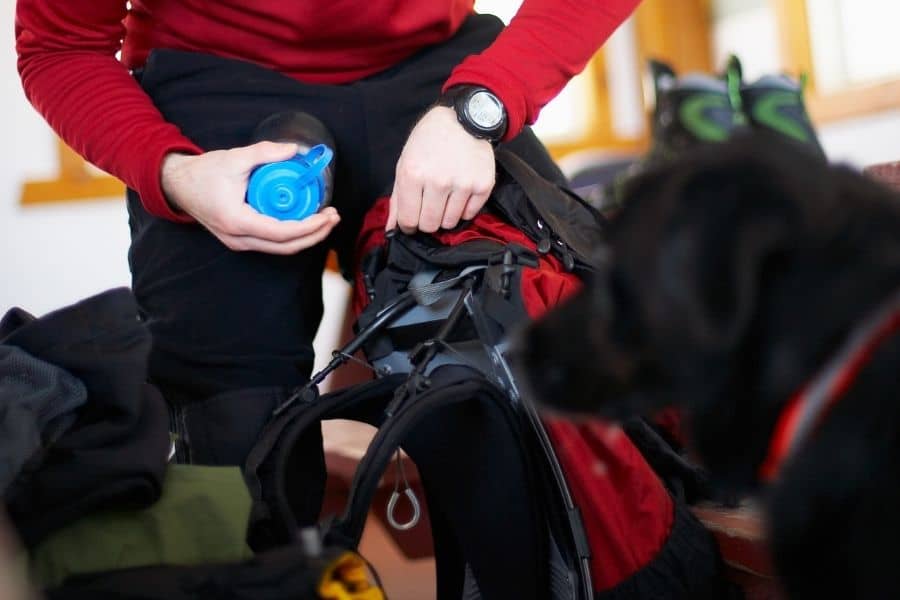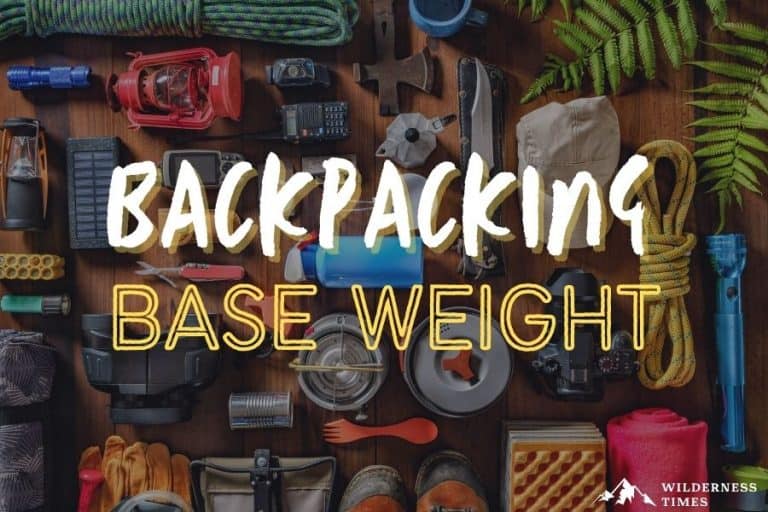Backpacking is the perfect activity for those who love spending time exploring the outdoors.
There’s no shortage of beautiful scenery and crisp, fresh air that you can experience while backpacking, and it’s a favored past-time for millions of people around the world.
New backpackers can find it a physically challenging activity and, if you don’t know any better, then the base weight of your pack may be causing you more of a challenge than necessary.
Finding the ideal base weight for your pack will help you get the most enjoyment out of your backpacking trip possible.
If you’re not carrying around excessive weight, then you’ll be able to hike faster, for longer, and won’t put your body under as much strain.
Let’s dive into what exactly the base weight of your pack means, what a good range of weight is, and how you can keep that weight down.
What Is Backpacking Base Weight?

For newbie hikers and backpackers, there are a lot of terms to learn. If you’ve never heard of the term base weight before, then you might not be sure exactly what that’s referring to.
The base weight of your pack refers to the weight of all your items (including your pack).
However, your base weight doesn’t include the weight of your consumables, such as food, water, or fuel, and it doesn’t include the weight of what you’re wearing.
The reason it’s so important to understand your base weight and what a good range would be for you is so that you can avoid adding too much extra weight to your pack.
The more weight you have in your pack, the more strenuous your backpacking trip will be.
Keeping a low base weight will make your backpacking trip easier and leave you more wiggle room for carrying additional fuel, food, and water.
How Is Base Weight Calculated?
Calculating your base weight is actually pretty simple.
All you need to do is take the full weight of your loaded pack and subtract the weight that comes from all your consumables. Basically, you’re subtracting the weight that your food, water, and fuel add to your pack.
Base Weight = Full Weight of Loaded Pack - Consumables
Say, for example, that your pack weighs 40 lbs when it’s completely loaded.
Once you remove your food, water, and fuel, your pack may only weigh 25 lbs.
In this example, 25 lbs would be the base weight for your pack.
How Heavy Should A Backpacking Pack Be?

Finding the right weight for your backpack can be tricky, but there is a science to it.
Most backpackers abide by the belief that a full backpacking pack shouldn’t weigh more than 20% of your body weight.
This is because too much weight can cause you to have trouble during your backpacking trip. If your pack is too heavy for you to comfortably carry for the duration of your trip then you could end up having to cut your trip early or experiencing pains in your shoulders and back.
An average 200 lb backpacker should keep their pack to around 40 lbs, while someone who is only 150 lbs will want a pack that weighs around 30 lbs. This is just a general guideline, and it may not work for everyone.
Very petite backpackers may have trouble keeping their pack’s weight to 20% or less of their body weight, simply because the essentials alone may cause their pack to weigh more than 20% of their body weight.
Some very physically fit people may have no difficulties carrying a pack that weighs more than is recommended. Others may have learned through experience that carrying some extra comforts is worth hauling around the extra weight.
Keeping your backpacking pack at 20% of your body weight is an excellent guideline to follow, but it’s not set in stone. Through experience, you’ll learn what works best for you.
What Should My Backpacking Base Weight Be?
Every person’s ideal base weight for backpacking is going to be different.
It will depend on your height and weight, physical fitness level, and endurance. Some people who have a lot of experience backpacking and are in peak physical condition can handle a 30 lb base weight.
For beginners, especially those who haven’t done much strength or endurance training, you may need a base weight of only 5-10 lbs. A good range for the average backpacker is to keep their base weight between 20-25 lbs.
You’ll want to keep in mind that your base weight includes the weight of the pack itself, so if you’re a smaller woman, then you may want to look into some of the best backpacks for women. They’ll have all the functionality you need with a lower than average weight.
How To Lower Your Backpacking Base Weight

There’s a lot of benefits to keeping your backpacking pack’s base weight low.
You’ll be able to travel faster and farther when you’re carrying less weight. It will also put less physical strain on areas of your body that tend to carry most of the burden during backpacking, such as your shoulders and back.
The best way to lower your backpacking base weight is to start by determining what your ideal base weight is. Once you have that number in your mind, you can start looking at the gear that you’re planning on bringing with you.
1. Weigh Everything
Use a kitchen scale or similar to weigh out each piece of gear that you’re planning on bringing.
Weigh your clothes, small tent, camping stove, sleeping bag or backpacking quilt, and anything else that you plan on putting into your pack.
You should write down the weight of each item in a notebook or spreadsheet so you can keep track of how much each item weighs. Once you’re finished, add up all the individual weights to get a final number.
Then, you can take a look at that number and decide how many pounds you want to take off. After that, you can move on to the next step.
2. Remove Non-essential Gear
Most backpackers will have their packs in the 20-25 lb range.
If you’re aiming to get under 20lbs, then you would be considered a lightweight backpacker.
Anyone whose pack has a base weight of under 10 lbs is considered an ultralight backpacker.
Whether you’re trying to move down a category or simply want to relieve your pack of some weight, the best way to do it is to determine which essentials you can live without.
If you’re bringing two fleece jackets, but one weighs more than the other, then you should ditch the heavier jacket.
The same goes for everything else in your pack. Ask yourself how essential each piece of gear you’re planning on bringing is.
- Do you really need a camping pillow for your backpacking trip, or can you use your jacket?
- Could you still enjoy your backpacking trip with just two changes of clothes instead of four?
Getting rid of the non-essentials will help you keep your pack’s base weight to the lowest weight possible.
Don’t be afraid to try new things and go without some favorite creature comforts. You may surprise yourself with how comfortable you can be without some comforts that you’ve become attached to.
Also See: Overnight Backpacking Checklist
3. Replace Old Gear
A great method for keeping your base weight low is to replace your old gear once in a while.
If it’s your sleeping bag that’s putting you over the weight you’re hoping for, then consider going out and getting a new, lighter one.
There’s new gear coming out every year that’s designed to be lighter and more compact. You can continuously replace your old gear with new, lighter versions that will work just as well, but reduces the weight in your pack.
This can work for almost everything that a backpacker is going to be carrying.
New sleeping bags, sleeping pads, clothes, camp stoves, and more are being made to be lighter than their older versions. If you really want to lower the base weight of your pack, then jump on this trend and start replacing your old gear!
4. Choose The Right Pack
Picking the correct pack for your backpacking trip is essential to keeping your base weight low.
Humans tend to be opportunistic, and if you have a large pack with some empty space, then you’re likely to feel an urge to fill that space. This adds more weight than you need, which is why it’s so important to find a pack that suits your adventure.
You don’t want to bring along a fully decked-out pack that’s made for hiking the entire Pacific Crest Trail if you’re only going to be gone for a weekend. In that case, search for a great weekend trip backpack instead.
Likewise, you don’t need a pack with a ton of room if you’re planning on camping in one spot and going out for day trips. There are other options you can look into, such as backpacks with detachable day packs. These will allow you to just carry the smaller day pack with you when you go out during the day, which will significantly reduce the weight you’ll need to carry, and you can leave the larger part of the pack at camp!
Distribute Weight Evenly When You Pack

Whether you’re aiming for a base weight of 10 lbs or 30 lbs, the way that you pack your gear is going to be a big difference.
If you’re just cramming your gear haphazardly into your pack, then it’s going to feel off-kilter and cause part of your shoulders and pack to take on more weight than others.
Evenly distributing the weight throughout your pack is essential to having an enjoyable backpacking trip that doesn’t end in a pulled-back muscle. Here are some simple steps you can follow to get the weight in your pack evenly distributed.
- Start with your sleeping gear. Put all your sleeping gear on the bottom of your pack, including packing your tent, sleeping bag/quilt, sleeping pad, camping pillow, etc. This creates a soft and weighted bottom for your pack.
- Place your food and cooking equipment next. Adding your heaviest items, such as your food, fuel, camping stove, etc, on top of your sleeping gear will place them right in the center of your back when you put on your pack. This is the perfect spot because your back and shoulder muscles will be able to share the burden of that weight. Placing the heaviest items too low or too high in your pack can cause serious muscle strain and should be avoided.
- Add your clothing and lighter gear on top. The top of your pack should contain your lightest gear such as your clothing, first-aid kit, toiletries, water purifiers, binoculars, etc. This will give you easy access to these items as you’re hiking throughout the day and will keep them from being squished by the heavier items in your pack.
If you follow these simple steps, then you’ll have a pack with evenly distributed weight that’s perfect for any backpacking adventure.
Final Thoughts
Backpacking is a fun adventure, but there’s a lot to learn about how you can make this trip as enjoyable as possible.
Learning the best base weight for your pack will help you keep your pack from becoming overloaded, and will keep your body from struggling with the weight.
If you use these tips, then you’re sure to have an enjoyable and easy trip!


